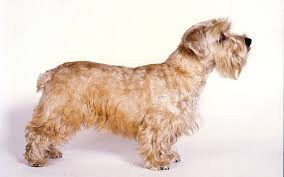
Lucas Terrier
Conditions of detention
Lucas Terriers are adaptable and can live comfortably in various environments, including apartments and houses with yards. They enjoy human companionship and do best in homes where they are not left alone for extended periods.
Useful Fact: Lucas Terriers are well-suited for both city and country living, making them versatile companions for different lifestyles.
Nutrition and diet
A balanced diet tailored to the Lucas Terrier’s age, size, and activity level is essential. High-quality commercial dog food or a carefully planned homemade diet can meet their nutritional needs.
Useful Fact: Including lean meats and vegetables in their diet can help maintain the Lucas Terrier’s energy levels and overall health.
Health
Lucas Terriers are generally healthy, with fewer genetic issues compared to other breeds. However, regular veterinary check-ups are necessary to ensure their ongoing health and to catch any potential issues early.
Useful Fact: Lucas Terriers have a lifespan of 12-15 years, highlighting the importance of consistent health monitoring and care.
Grooming and care
Lucas Terriers have a dense, wiry coat that requires regular grooming to prevent matting. They come in various colors, including white, tan, and black. Regular brushing and occasional professional grooming keep their coat in top condition.
Useful Fact: Brushing your Lucas Terrier’s coat 2-3 times a week helps reduce shedding and keeps their coat healthy.
Education and training
Lucas Terriers are intelligent and respond well to positive reinforcement training methods. Early socialization and consistent training are key to preventing behavioral issues.
Useful Fact: Training sessions that include games and varied activities can keep a Lucas Terrier engaged and motivated.
Toys and entertainment
Lucas Terriers enjoy a variety of toys, especially those that challenge their intelligence and hunting instincts. Interactive and puzzle toys are particularly beneficial.
Useful Fact: Providing a mix of toys can help prevent boredom and destructive behaviors in Lucas Terriers.
Safety
Keeping a Lucas Terrier safe involves supervision during outdoor activities and ensuring they are always on a leash or in a secure, fenced area.
Useful Fact: Due to their small size and hunting instincts, Lucas Terriers should be monitored closely around small animals and in busy areas.
Accessories
Appropriately sized collars, harnesses, and leashes are important for a Lucas Terrier. They also benefit from comfortable bedding and suitable crates for travel or home use.
Useful Fact: In colder climates, Lucas Terriers can benefit from wearing dog coats or sweaters to stay warm.
Socialization
Early socialization with different people, environments, and other animals is crucial for a well-rounded Lucas Terrier. This helps them become confident and friendly adults.
Useful Fact: Puppy socialization classes can provide structured social opportunities for Lucas Terriers.
Travel and Transportation
Lucas Terriers adapt well to travel if their comfort and safety are ensured. Using secure pet carriers or travel crates is recommended.
Useful Fact: Lucas Terriers often enjoy car rides, making them good companions for road trips and family outings.
Behavior and psychology
Lucas Terriers are known for their affectionate and lively nature. They enjoy being part of family activities and can develop strong bonds with their owners.
Useful Fact: Mental stimulation through training and interactive play is essential to keep Lucas Terriers happy and well-behaved.
Legal aspects
Owning a Lucas Terrier requires adherence to local pet ownership laws, including licensing, vaccination requirements, and leash laws.
Useful Fact: Microchipping your Lucas Terrier can greatly increase the chances of being reunited if they ever get lost.


